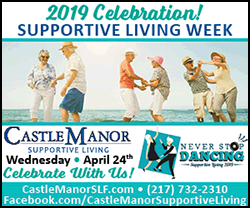|
Four Hong Kong 'Occupy' leaders jailed
for 2014 democracy protests
 Send a link to a friend
Send a link to a friend
 [April 24, 2019]
By James Pomfret and Jessie Pang [April 24, 2019]
By James Pomfret and Jessie Pang
HONG KONG (Reuters) - A Hong Kong court
jailed four leaders of 2014 pro-democracy protests on Wednesday amid
heightened concerns over the decline of freedoms in the China-ruled city
nearly five years after activists took to the streets in mass protests.
The sentencing of the nine activists followed a near month-long trial
that was closely watched as China's Communist Party leaders have put
Hong Kong's autonomy under increasing strain, stoking concern among
foreign governments, rights groups and business people.
Law professor Benny Tai, 54, and retired sociologist Chan Kin-man, 60,
were both jailed for 16 months for conspiracy to commit public nuisance
tied to the protests that paralyzed parts of the Asian financial center
for 79 days in late 2014 and became known as the Umbrella Movement.
Their sentence had been reduced by two months given their clean criminal
record and positive character, Justice Johnny Chan said.

Pro-democracy lawmaker Shiu Ka-chun and activist Raphael Wong were both
jailed for eight months for inciting public nuisance.
"We maintain our determination to achieve universal suffrage ... this
won't change," Wong shouted out in court as he was taken away.
Since the city returned to Chinese rule in 1997, critics say Beijing has
reneged on a commitment to maintain Hong Kong's high degree of autonomy
and freedoms under a "one country, two systems" arrangement.
The protesters had demanded that China's Communist Party leaders allow
genuine universal suffrage in Hong Kong to select its leader. Police
cleared the demonstrators in December 2014, and authorities granted no
democratic concessions. For an explainer, click: [https://reut.rs/2IzSFWA]
Chan, in passing sentence, acknowledged the right to civil disobedience
and the right of assembly and free speech, but said the protracted road
blockages had caused suffering to the public and that some restrictions
on freedoms were necessary in a democratic society.
Retired pastor Chu Yiu-ming, 75, received a suspended sentence, as did
veteran democrat Lee Wing-tat and former student leader Eason Chung,
with the judge taking into account their ages, public service and clean
records.
Another former student leader, Tommy Cheung, was ordered to carry out
200 hours of community service.
Tanya Chan, a lawmaker, had her sentencing postponed until June 10 on
medical grounds.

Several hundred supporters, many wearing yellow bands and holding yellow
umbrellas, a symbol of the protests, gathered outside the West Kowloon
Law Courts. Some sobbed after the sentences were announced while others
chanted demands for genuine democracy.
The trial of the activists was considered the most significant legal
maneuver by authorities to punish those involved in the 2014 protests,
called Occupy Central, in reference to the city's central business
district.
The demonstrations were Hong Kong's biggest and most protracted in
recent decades and one of the boldest challenges to China's leaders
since pro-democracy protests in and around Beijing's Tiananmen Square in
1989.
[to top of second column]
|

Occupy Central pro-democracy movement founder Chu Yiu-ming cries as
he speaks to the media after getting his suspended sentence on his
involvement in the Occupy Central, also known as "Umbrella
Movement", in Hong Kong, China April 24, 2019. REUTERS/Tyrone Siu

Organizers estimated that more than one million people took part in
the protests over nearly three months.
EXTRADITION LAWS
Authorities have clamped down on opposition forces, disqualified
democratic legislators, jailed activists and banned a
pro-independence political party.
Before the sentencing, rival political groups outside the court had
taunted each other, with pro-democracy activists calling for Hong
Kong leader Carrie Lam to step down, while Beijing loyalists
chanted: "Go away. Go occupy London."
The activist leaders earlier urged supporters to take to the streets
this Sunday to protest against proposed extradition laws that would
allow people to be sent from Hong Kong to mainland China for trial.
Critics fear the laws, which are expected to be passed this year,
could further erode legal protections.
All nine had argued the protests were intended as peaceful,
non-violent civil disobedience, only to benefit society and make
positive democratic progress.
But Justice Chan said their "martyrdom ... was a concocted one",
noting that the price the defendants were prepared to pay had also
to be borne by an inconvenienced public.
A court found the nine guilty of public nuisance charges on April 9.

The case has stoked international worries.
"It would be deeply concerning if the outcome for these individuals
were to deter the people of Hong Kong from participating in peaceful
protest in the future," said a representative at the Hong Kong
consulate of former colonial power Britain.
The U.S. consulate said in a statement it was concerned by the Hong
Kong government's decision to bring the charges against organizers
of the "peaceful protests in 2014".
"Such prosecutions can stifle the exercise of the basic freedoms
enshrined in the Basic Law," said a U.S. consular spokesman,
referring to the city's mini constitution.
Taiwan's Mainland Affairs Council said in a statement that it
"deeply regretted" the court's decision, which it said showed the
failure of "one country, two systems" to protect political rights.
(Additional reporting from Greg Torode in Hong Kong and Yimou Lee in
Taipei; Editing by Simon Cameron-Moore, Robert Birsel)
[© 2019 Thomson Reuters. All rights
reserved.]
Copyright 2019 Reuters. All rights reserved. This material may not be published,
broadcast, rewritten or redistributed.
Thompson Reuters is solely responsible for this content.
 |